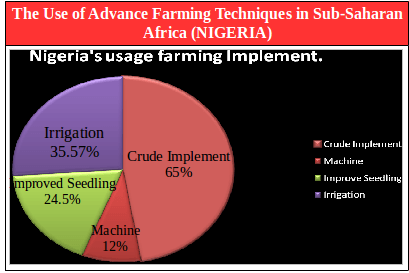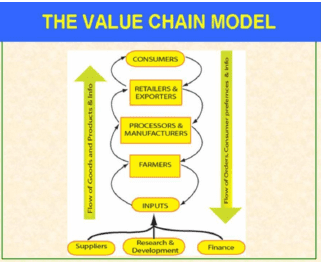Agriculture
Agricultural Value Chain Benefit

Value Chains reside at the core of high-impact and sustainable initiatives focused on improving productivity, competitiveness, entrepreneurship, and Small-Medium Enterprises (SME) growth. Value Chain thinking is revolutionizing agriculture and the food industry. Focus has shifted from agricultural production to consumer demand, marketing and the coordination of product flows from producer to consumer. The Value Chain concept acknowledges that production must be linked to demand and the critical role of organizing the flow from farmer to consumer opportunities.
A Value Chain links the steps a product takes from the farmer to the consumer. It includes research and development, input suppliers, production, processing, marketing and finance.
Over the years Agriculture have proven to be one viable sector more than capable of contributing 75% to the GDP [economy] of most nation as against its current giving of 43% in a country so dependent on oil, like Nigeria. There are innumerable amount of value chain in the house of Agriculture, from cultivation to the final consumer and to the individual farm produce, it goes all the way. The nature of agricultural development and the way food is produced, processed and sold is changing rapidly. Consumers increasingly want safe, higher value, and varied agricultural products. This is creating opportunities for farmers and agribusiness entrepreneurs along agricultural value chains to transform commodities into higher value products—a process that can play an important role in poverty reduction.
Rural poverty in Africa and Nigeria most especially remains high despite effort made in poverty alleviation. The rural poor, who often depend on agriculture for their livelihoods, can benefit from changes in agriculture, provided they are part of the emerging value chain. It then implies that this factors draws lessons for AgriSMART future engagement in this area, and particularly how the rural poor can participate in the value chain.
For a country such as Nigeria and most west African nations, Internal and External support for agricultural value chains is an important option for agricultural development, because higher financial returns can be realized through value-enhancing inputs. Improvements in the effectiveness and efficiency of agricultural value chains can also enhance benefits to all participants in the value chain, and contribute to food security and poverty reduction. The humongous change in the context and the value-enhancing revolution occurring currently in the chains of agriculture is benefiting nationals and multinational agribusiness, but small firms and other forms of agribusinesses can also benefit from the massive revolution in Agriculture.
A study on agricultural value chain concluded with, after making this few brilliant recommendation on how to revitalize the sector through making adequate use of advantage presented to Nigeria via agricultural value chain. It is said that countries need to adopt a comprehensive approach to policy, regulatory and institutional reform to remove constraints to the development of agriculture value chains; and that countries and projects need to identify the infrastructure requirements for the development of value chains and develop models for including the poor and marginalized groups in them. Secondly, Nigeria will have to adopt a program with the singular objectives of developing specific commodity value chains. The overall objective of this program will be to identify and remove all major constraints to achieving competitiveness, and to also ensure equitable returns for producers and those who operate within the local and export food distribution systems. Here is the point where AgriSMART will come in to bridge the existing lacuna.
A Holistic Agricultural Value Chain Diagram and Description.
Farming is the starting point of food production in every nation. Making it more attractive seem apparently difficult at the moment, currently 45% of Nigeria mode of cultivation remains the local way of tilling the soil with crude farming implement resulting to lower production and heavy energy utilization, which have been the bane of growth and development of Agricultural sector and contributing 65% to Nigeria’s Import of food commodities. On the other hand, commercial agriculture is the prototype of definition based on development of the sector. It transcends beyond farming for the family and generating 75% food production for citizens [food security], excess for export, and massive employment.
Statistically, Nigeria is still 59% backward in Agricultural cultivation and 53% behind her usage of arable land. But it goes without saying, that if the most populous black nation continues to confuse negative development for positive growth and development, Nigeria will find viable lands too scarce for agricultural purpose.
The inadequacy associated with processing raw material into finish product have been the major challenge limiting Nigeria’s agribusinesses from taking it’s place in the annals of agricultural history in the world.
AgriSMART conducted a survey in 2012, to ascertain the quantity of agricultural produce that goes to waste during processing and loss connected with raw materials unprocessed. The result of the survey gives rise to worry for the future of Agriculture in Nigeria. It was recorded that 72% of agricultural produce in the North are sold without any form of processing what so ever, only 16% goes for processing and 12% goes to waste. On the other hand, the survey compared it with that produced in the South, West and the East and took the average percentage value to ascertain the desired result to validate the test. 49.5% are sold without processing, 25.5% is processed into several other products and 25% to waste. This simply implies that for every agricultural produce left unprocessed goes to quick consumption, outright sale, and little consideration is given to storage which have results to food insecurity and every year Nigeria is losses billions of dollars from unprocessed raw materials.
Marketing.
The commercial processes involved in promoting and selling and distributing a product or service has been comatose, allowing so many players in the game to shortchange the farmers and consumers. Marketing is most vital in the re-structuring of agribusinesses and it is a very valuable value chain that could accommodate a massive number of Nigerians if there is a proper value-enhancement of this category. According to a study in 2013, marketing system for agricultural produce have discouraged farmers from producing and buyers from getting quality [value] for their money.
However, for marketing system in the country to be more effective and efficient as postulated by AgriSMART study, says that sub-Saharan African, Nigeria must strongly consider building a one-stop-market where farmers can sell their products with ease (ready market for agribusinesses), bridge the big gap between the farmers and the consumer, though, that have been settle thanks to the setup of AgriSMART project (digitizing agribusiness), and involve a large number of extension agents to educate and create a massive awareness for both the rural/urban farmers (whether commercial/subsistence) on the international acceptable standard and shape of agricultural produce for export purposes. Adopting this few less rigorous steps Nigeria will be broadening the value chain in this group, making it possible for large number of people to come in and make it a business.
Transportation/Distribution.
Nigeria transportation sector is averagely sound at the moment, the only issue is with the road-network as documented by a research carried out in 2011, by AgriSMART. AgriSMART identified that agricultural activities are predominantly carried out in rural axis of Nigeria, hence, must receive adequate consideration when it comes to distributing products to urban centers. It was identified that there are poor road-network in the rural areas around the country making it difficult to move things to and fro for different purpose. Considering the fact that agricultural produce are mostly perishable commodities, it is pertinent that agricultural produce are transported from the farm and it arrives the location on record-time to avoid any form decay. AgriSMART found out that on the average 57.44% loss is attributed to bad road. Most transporters that were interviewed by AgriSMART in 2011, said that sometimes they commit 2-3 days on the road, which is a enough time for deterioration to set in on the raw materials.
Retailers/Wholesalers (Consumers).
Wholesalers buys and sells in large quantities and in most cases they resells to other merchants (Retailers) rather than to the ultimate customers, in contrast to retailers, who are the direct link to the consumers. They sell in small quantities and products are not re-sold.
This are the groups saddled with the responsibilities of final distribution to the consumers, it is very obvious that 82.5% of Nigerians are involved in one way or the other in this value chain. It depicts buying and selling, from where the final consumers get their consumables. They are the shopping malls, corner shops and other open market in the country. This value chain is the most easier of the lot for individuals to enter, hence, so many SMEs which is currently contributing 55% to Nigeria’s GDP and will do more if the value is properly enhanced.
NB: There are enormous value chain associated to individual agricultural commodities across the federation, considering how rich Nigeria is agriculture.
Benefits of Commodity Value Chain Approach.
- Buyers are assured of product quality, supply and safety through integrated systems from production to retail.
- Suppliers are more assured of a market and the benefits of economies of scale.
- Improved access to markets.
- Reduced time to respond to changing customer demand, as a result of better communication with chain partners.
- More rewarding business relationships – collaborative versus adversarial.




















